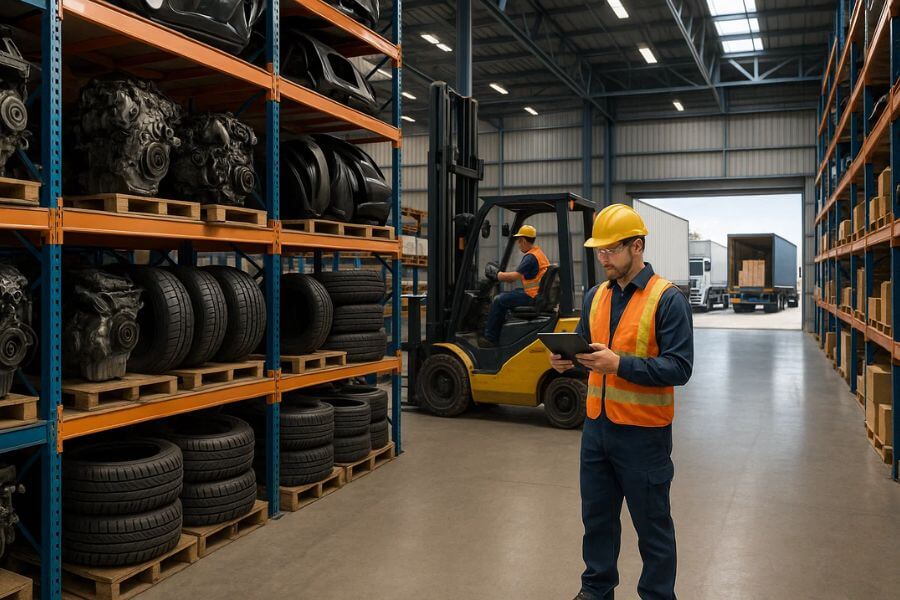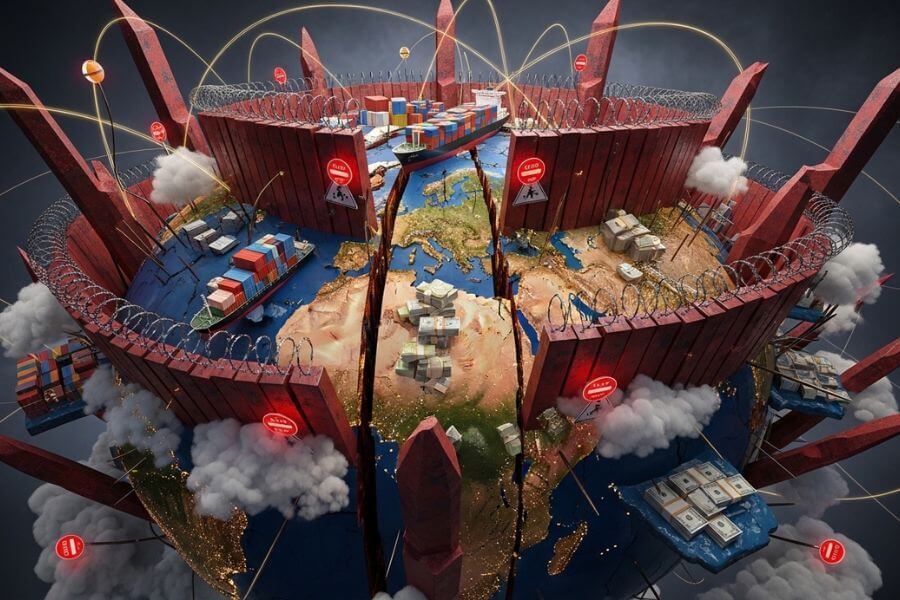The automotive industry is one of the largest and most vital sectors in the global economy, contributing to job creation, technological advancements, and international trade. However, it also faces numerous logistical challenges due to the scale and complexity of its operations. Automotive companies must manage a broad range of parts and components, coordinate international shipping, adhere to ever-changing regulations, and keep costs under control, all while striving to meet customer expectations for fast delivery and high-quality products.
In this blog post, we’ll explore the top 10 logistics challenges facing the automotive industry today and examine how third-party logistics (3PL) providers can help solve these issues.
1. Complex global supply chains
Automotive companies source parts and raw materials from all over the world, creating a highly interconnected supply chain. These global supply chains often span across multiple countries, including emerging markets, developed economies, and regions with varying levels of infrastructure quality.
The challenge
Managing such a diverse and far-reaching supply chain presents several difficulties. Companies must deal with fluctuating tariffs, customs regulations, varying transportation infrastructures, geopolitical risks, and language barriers. Any disruptions in one part of the supply chain can lead to delays, inventory shortages, or production bottlenecks. Moreover, companies must adapt to global supply chain dynamics, such as changing trade policies or unexpected natural disasters.
How 3PL solves it
3PL providers are experts in managing complex, international supply chains. They provide end-to-end logistics solutions, including freight forwarding, customs clearance, and compliance management. By leveraging their extensive networks, 3PLs can ensure that automotive companies stay up to date with international regulations, avoid costly delays, and keep the supply chain flowing smoothly. Additionally, 3PLs offer visibility through integrated systems that allow companies to track shipments in real time, thus improving transparency and decision-making.
2. Inventory management and stockpiling issues
The automotive industry must manage large volumes of parts and components that need to be stored efficiently. Inadequate inventory management practices can lead to overstocking, which results in high storage costs, or stockouts, which can lead to production halts and missed sales opportunities.
The challenge
Managing the sheer scale of automotive inventory is challenging due to the number of individual parts and components required. Improper inventory management practices can lead to a mismatch between supply and demand, which can impact production schedules. For example, parts needed for assembly may not be available when required, leading to production stoppages. In addition, slow-moving parts may take up valuable warehouse space, tying up capital in unsold goods.
How 3PL solves it
3PL providers offer advanced inventory management solutions that help automotive companies optimize stock levels. Using real-time data, 3PLs forecast demand, track part movements, and ensure that inventory is replenished on time. By implementing just-in-time (JIT) inventory models, 3PLs minimize the risk of overstocking while ensuring that the right parts are available when needed. Furthermore, 3PLs use sophisticated warehouse management systems (WMS) to track inventory levels accurately and efficiently, ensuring that stock is organized and easy to access.
3. Managing transportation costs
Transportation is one of the most significant costs in automotive logistics, and automotive companies often face the challenge of rising transportation expenses. Factors like fuel price volatility, labor shortages, and the increasing cost of transportation services can put considerable pressure on automotive companies’ logistics budgets.
The challenge
The automotive sector often relies on a mix of transportation methods, such as air, sea, rail, and road, for global shipments. The cost of these services can fluctuate dramatically, depending on market conditions and fuel prices. Additionally, automotive companies must deal with the cost of last-mile delivery, which is especially costly in urban areas or remote locations.
How 3PL solves it
3PL providers offer cost-effective solutions to help automotive companies reduce transportation expenses. With access to a broad network of shipping carriers and suppliers, 3PLs can negotiate competitive rates and offer discounts based on volume. They also use route optimization software to plan the most efficient shipping routes, reducing fuel consumption and transportation time. By consolidating shipments, 3PL providers can maximize load efficiency, which helps lower the cost per unit. Furthermore, many 3PLs offer flexible transportation solutions, allowing companies to scale operations according to demand fluctuations.
4. Customs and compliance regulations
Given the global nature of the automotive supply chain, automotive companies must comply with customs regulations, tariffs, and trade restrictions in multiple countries. These regulations vary widely by region and can change frequently, making it difficult for automotive companies to stay compliant.
The challenge
Non-compliance with customs regulations can result in costly fines, delays, and damage to a company’s reputation. In addition, navigating different customs procedures and tariffs can be time-consuming and complicated, especially when parts are being shipped across multiple borders.
How 3PL solves it
3PL providers are experts in customs compliance and international trade regulations. They manage all aspects of the customs process, from paperwork and documentation to tariff classifications and duty payments. By partnering with a 3PL, automotive companies can ensure that their shipments are compliant with local, national, and international regulations. Furthermore, 3PLs maintain relationships with customs brokers and regulatory bodies, ensuring that automotive companies avoid delays and fines while keeping their supply chains running smoothly.
5. Supply chain visibility and data analytics
In the fast-paced automotive industry, having clear visibility across the entire supply chain is crucial for efficient operations. Without accurate data and real-time tracking, it’s difficult to identify potential disruptions, inefficiencies, or opportunities for improvement.
The challenge
Automotive companies often struggle with fragmented data across various departments, making it difficult to track shipments, manage inventory, and monitor performance. The lack of visibility leads to poor decision-making and slower response times to supply chain disruptions. Furthermore, many companies lack the analytical tools necessary to identify trends, forecast demand, and optimize operations.
How 3PL solves it
3PL providers offer sophisticated technology platforms that integrate data from multiple sources across the supply chain. By providing real-time updates, tracking capabilities, and performance analytics, 3PLs help automotive companies gain full visibility of their operations. With data-driven insights, automotive companies can make more informed decisions, predict disruptions, and optimize their logistics processes. Many 3PLs also offer predictive analytics, which helps companies forecast demand, reduce stockouts, and adjust inventory levels proactively.
6. Handling demand fluctuations
The automotive industry is subject to unpredictable changes in consumer demand. Factors like economic shifts, changing consumer preferences, or the introduction of new models can cause significant fluctuations in demand, creating supply chain challenges.
The challenge
Demand fluctuations can make it difficult for automotive companies to maintain balanced production levels. During periods of high demand, companies may struggle to keep up with production schedules. Conversely, during slower periods, they may be left with excess inventory and underutilized resources.
How 3PL solves it
3PL providers offer flexible logistics solutions that can quickly scale up or down based on demand. For example, during periods of high demand, 3PLs can increase warehouse capacity, secure additional carriers, and expedite shipping. During slower periods, they can help companies reduce warehousing costs and optimize transportation. By leveraging their global networks and capabilities, 3PLs can efficiently handle fluctuations in production schedules, ensuring that automotive companies meet customer demands without overburdening their logistics operations.
7. Reverse logistics and returns management
As automotive companies sell to both businesses and consumers, they must manage reverse logistics, which involves handling returns, repairs, and warranties. This can be a particularly challenging and costly part of automotive logistics.
The challenge
Managing returns is especially difficult in the automotive industry because parts are often highly specialized, bulky, and costly. Handling defective parts, repairing them, and returning them to inventory or the supply chain can be complex and costly.
How 3PL solves it
3PL providers specialize in reverse logistics, offering streamlined processes for returns, repairs, and refurbishments. They can handle the entire returns process, from inspecting and processing returned parts to shipping refurbished items back to customers or dealers. By optimizing the reverse logistics process, 3PLs help automotive companies reduce costs, improve turnaround times, and enhance customer satisfaction.
8. Warehouse management and storage capacity
The automotive industry requires extensive warehouse space to store parts, components, and finished products. However, managing large-scale warehouse operations can be costly and inefficient if not handled properly.
The challenge
Automotive companies often struggle with high warehousing costs and underutilized space, especially during periods of fluctuating demand. Poorly managed warehouses can lead to disorganization, longer picking times, and increased labor costs.
How 3PL solves it
3PL providers offer flexible warehousing solutions, including shared warehousing, that allow automotive companies to reduce storage costs while still meeting demand. By utilizing cutting-edge warehouse management systems (WMS), 3PLs optimize inventory flow, reduce storage costs, and improve order fulfillment speed. Additionally, 3PLs can provide strategically located warehouses to reduce transportation time and costs.
9. Last-mile delivery challenges
Last-mile delivery is the final leg of the supply chain journey, where goods are delivered from a distribution center to the customer’s door. For automotive companies, last-mile delivery can be particularly challenging when it involves large or heavy parts.
The challenge
In automotive logistics, last-mile delivery often involves bulky parts or sensitive equipment that require specialized handling. Moreover, meeting tight delivery windows or reaching remote areas can increase costs and delivery times.
How 3PL solves it
3PL providers have established local delivery networks and specialized carriers that handle last-mile deliveries efficiently. Whether it’s delivering small auto parts to a dealership or large components to a manufacturer, 3PLs ensure that deliveries are timely, accurate, and cost-effective. By using advanced route optimization software, 3PLs can reduce transportation costs and improve delivery times, even in urban or rural areas.
10. Sustainability and environmental concerns
As environmental regulations become more stringent, automotive companies are under increasing pressure to adopt sustainable logistics practices. This includes reducing carbon emissions, cutting waste, and ensuring compliance with environmental laws.
The challenge
Sustainability is a growing concern in logistics, as the automotive industry is responsible for significant carbon emissions from transportation and warehousing. Automotive companies must find ways to reduce their environmental footprint while still maintaining efficiency.
How 3PL solves it
3PL providers are increasingly focusing on green logistics solutions. They use electric vehicles, optimize transportation routes to reduce fuel consumption, and implement sustainable packaging materials. Many 3PLs also comply with environmental regulations and offer carbon offset programs, helping automotive companies reduce their environmental impact and improve their sustainability credentials.
Conclusion
The automotive industry faces significant logistics challenges, from managing complex global supply chains to meeting customer demands for fast, cost-effective delivery. However, by partnering with a reliable 3PL provider, automotive companies can overcome these hurdles and enhance their operational efficiency. With advanced technology, flexible logistics solutions, and a wealth of industry knowledge, 3PLs are helping automotive companies optimize their supply chains, reduce costs, and improve customer satisfaction. As the automotive industry continues to evolve, embracing 3PL solutions will be key to maintaining a competitive edge in an increasingly fast-paced and dynamic market.











